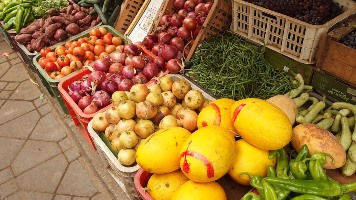Anujit Mitter tries to find out how safe or dangerous the enticing fruits, vegetables or fish being sold in local markets could be.
One of the most debated topics in households nowadays is the chronic exposure to pesticide/insecticide-smeared fruits and veggies or ingesting artificially ripened fruits.
Questions automatically arise about what precaution the elderly can take especially since the summer market is full of delectable-looking fruits ripened by the use of carbide.
Dr Avik Basu, general practitioner and intensivist, says, “The only way to avoid such exposure is to eat seasonal fruits or veggies during the time they are expected to ripen naturally. Otherwise, there is a risk of ingesting fruits or vegetables ripened by artificial agents like carbides.”
Asked what health risks do carbide and other ripening agents pose to the elderly, he replies: “These chemicals act mostly as neurotoxins, which upon progressive accumulation in the body, may lead to neurological manifestations i.e. tremor, mental confusion, irritability, paresthesia, convulsions. That is why it is advisable to wash fruits and vegetables bought from the market for sufficient time before they are consumed.”
About chlorine in fish and associated risks, the doctor says: “The same applies to chlorine used to store fish in markets. However, such cases are too rarely documented. Buying fresh fish from the market instead of fish kept in cold storage is a better option.”
“Since none can dispute how vital fish protein is for the elderly, we always advise patients to buy jyanto maachh (live fish) for consumption.”
On the risks associated with chlorine, Dr Basu says: “It is mostly a corrosive agent, which may lead to symptoms of gastric irritation if consumed in good amounts. However, the risk is too less compared to consumption of artificially ripened fruits.”
On whether health supplements can replace fish/ vegetable consumption, Dr Basu says: “Health supplements can never completely replace natural food elements. Only those individuals who are suffering from any particular disease like kidney ailments, liver disease or diabetes may need health supplements. The common misconception among people is that vitamin capsules can fill up the gaps in nutrition. But that’s completely wrong. Rather, taking too much vitamins can be detrimental for health.”
Coming to the issue of organic food, the doctor says: “Organic fertilisers and pesticides are always better and far more eco-friendly than the inorganic ones. So, it can be expected that organic food products will be safer for human consumption. But personally I haven’t yet tasted any such food products nor is there any sufficient post-marketing surveillance data on these products available in the Indian market. So, it will be difficult to comment on their efficacy. Nevertheless, in general, they should be safe for our daily consumption.”
Pic credit: https://pixabay.com/photos/fruit-bazaar-market-colors-2749020/



